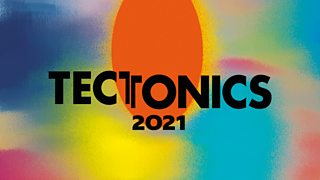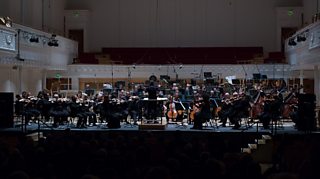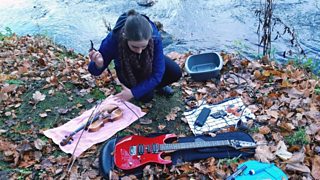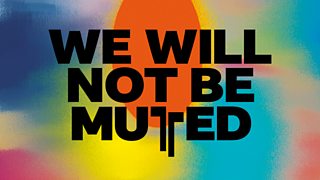Tectonics – why I can’t really tell you what we’re about to hear...
Every year, the Βι¶ΉΤΌΕΔ Scottish Symphony Orchestra takes a bold and beautiful risk with its weekend festival devoted to the blazingly, capriciously new, writes presenter Kate Molleson.
Tectonics is a platform for music that tests, probes and lingers in the margins. For music that refuses to conform. Sometimes (let’s face it!) some of the music doesn’t entirely work out. And yet the players of the Βι¶ΉΤΌΕΔSSO embrace that risk, knowing that the alternative – confining themselves to the already-trod – would be much more dangerous. Tectonics is a laboratory that requires the orchestra to exist in the present tense. It stretches the players in thrilling new directions and rejuvenates how they approach Beethoven and Bruckner, too. It reshapes how they sound, who listens, how they listen.
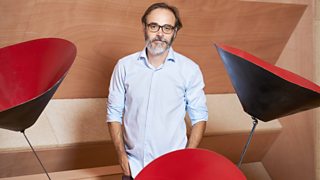
For me, the weeks leading up to this annual blast of jubilant newness involve a special kind of discovery. Whoops of astonishment emerge from between my headphones as I attempt to wrap my ears around the works and artists I’m soon to present on air. (Radio 3’s New Music Show is in residence; this year we’re broadcasting two back-to-back live programmes). Currently, my mind is being prised open by a Japanese Buddhist ritual chant called Shomyo, by music for organ and electronics, by music made on street corners in Berlin, by the fearsome energy of Tania León’s Cuban-infused work for brass band. I’m diving deep into the powerful soundworld of Graciela Paraskevaidis, a towering figure of Argentinian orchestral music, and I’m sinking into the slow-fi fibrousness of a Lithuanian composer called Egidija MedekšaitΔ— who fuses her love of textiles with the structures of Indian classical music. All these and more will feature over the weekend.
The festival was founded by conductor Ilan Volkov back in 2012 when he was was working with the Iceland Symphony Orchestra. Volkov’s ethos is charged with the energy of a place where the ground beneath your feet is literally eruptive, but it’s not just the geology of Iceland that’s relevant. It’s also the notion of placing an orchestra alongside local and international experimental musicians who exist outside the "classical" infrastructure. Somehow it fits that Tectonics emerged from a country of 300,000 where most artists tend to muck about in an edge-blurring, non-hierarchical creative sandbox.
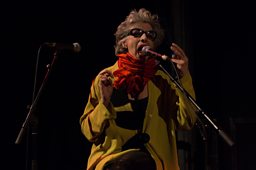
Thanks to the ongoing support of the Βι¶ΉΤΌΕΔSSO management and musicians, Glasgow has since taken over from Reykjavik as the festival’s physical and spiritual home. The taste for the new here dates back more than half a century to Norman Del Mar, a barnstorming conductor with hefty sideburns and an even heftier appetite for leading the orchestra through reams of modern repertoire. Now the Βι¶ΉΤΌΕΔSSO has in Volkov a principal guest conductor with unparalleled capacity to inhale cutting-edge work and unearth neglected composers from across the globe. Whatever scores are on his music stand, he tackles them all with an equally take-no-prisoners directness.
But it’s the breadth of the programme that really makes the festival tick. The brazen stylistic non-sequiturs. Alasdair Campbell – a fiercely discerning programmer who’s been supporting the alternative music scene in Scotland for decades – is responsible for bringing in musicians from outwith the classical sphere, be they Arab Strap’s Aidan Moffat or Mogwai’s Stuart Braithwaite. I remember the joy of Richard Youngs, hero of Glasgow’s DIY community, describing how he borrowed library books on orchestration and set to work on his 2014 Tectonics commission, writing out the hyper-charged rhythms of D-beat for symphonic percussion section.
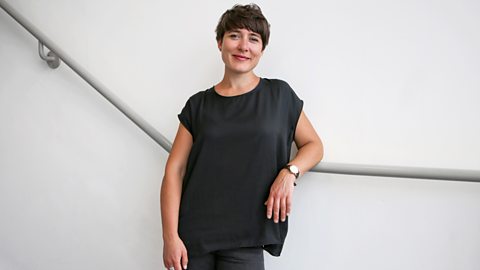
A flavour of Tectonics, with Kate Molleson
A montage of music by David Fennessy, George Lewis, Sarah Davachi and Ashley Fure.
In the Tectonics mix: Christian Wolff: Burdocks, with Martin Arnold, Juliana Hodkinson, Lucie Vitkova, Jorge Boehringer, Christian Wolff, Angela Sawyer, Mik Quantius, Maya Verlaak and Ilan Volkov (2019). David Fennessy: Prologue (Silver are the tears of the moon), with the Βι¶ΉΤΌΕΔ Scottish Symphony Orchestra conducted by Ilan Volkov (2016). George Lewis: Timelike Weave, with Mahan Esfahani (2019). Sarah Davachi: Oscen (2019); Ashley Fure: Bound to Bow (2018), with the Βι¶ΉΤΌΕΔ SSO conducted by Ilan Volkov.
The idea of Tectonics shouldn’t be as novel as it is. All orchestras should be thinking about how to open up their hallowed spaces and relate to the wider artistic communities on their doorsteps. Over the past decade the festival’s format has been taken up around the world, orchestras from Athens to Adelaide thirsty to be part of the conversation. I’ve attended iterations in Reykjavik, Oslo and Stavanger, witnessing luminaries of experimental music being given the space to do their thing. I’ve watched Alvin Lucier amplifying teapots; Annea Lockwood unveiling her grand, meditative River Maps; Christian Wolff leading playful collective improvisation around the foyers of concert halls. I’ve heard Roscoe Mitchell blowing up a solo saxophone storm; Ande Somby yoiking like a wolf in a Norwegian bank vault; Nathalie Forget summoning the microtonal marvels of Pascale Criton on ondes Martenot.
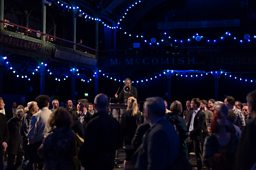
Last year’s archive edition took place in the depths of Glasgow’s first lockdown. No live music was possible, and our production team could only broadcast what we had available on the hard-drives grabbed before Covid regulations shut down the building completely. It turned out to be a powerful thing to stop and listen back. Sometimes it serves to take stock and revisit past milestones. This year we’re trying out a hybrid. The orchestra and some artists will be back in our beloved City Halls, filling the space with sound despite the much-missing energy of our audiences. Other artists are sending in material from around the world, extending the Tectonics community across oceans.
But one thing is certain. At a time when creative risk is itself at risk, the spirit of Tectonics feels more essential than ever. As artists emerge into a decimated post-pandemic cultural landscape, the commercial pressure to play it safe is strong. And yet never has it been more critical to find new ways of processing and articulating the unprecedented experiences we are all living through. Here’s to the risk-takers. Roll on Tectonics 2021.

Tectonics Glasgow 2021
-
![]()
Tectonics Glasgow 2021
Everything you need to now about this year's festival.
-
![]()
Tectonics Line-Up 2021
The full line-up for the festival of new and experimental music.
-
![]()
Meet the artists
Photos, profiles and programme information on this year's performers.
-
![]()
About the Βι¶ΉΤΌΕΔ Scottish Symphony Orchestra
Full details of the Orchestra's activities, with clips and forthcoming event information.
